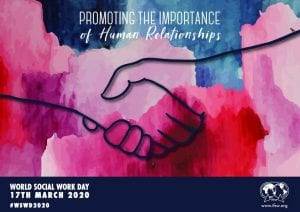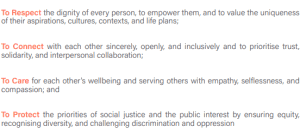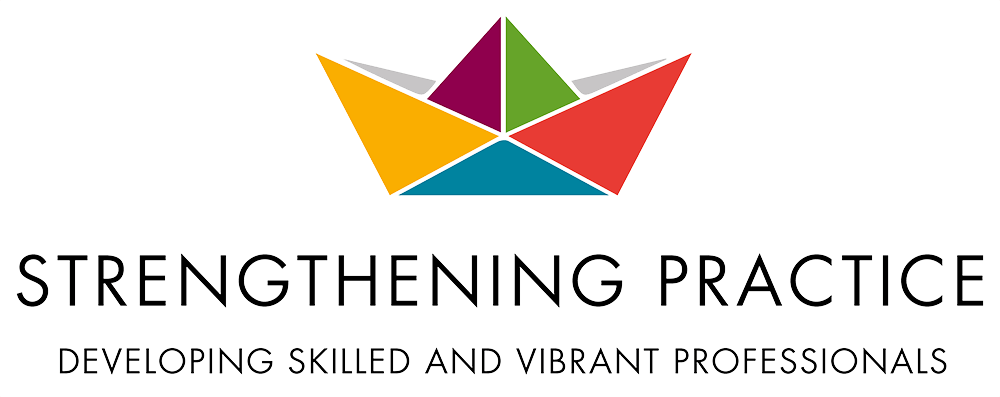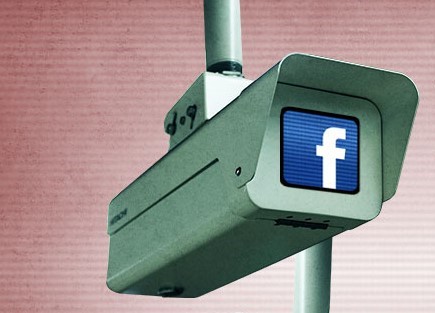We’ve been having a bit of a debate here at Strengthening Practice about the way in which social media is used by social workers in relation to child protection. Having a somewhat vested interest in the topic, and mindful of the upcoming World Social Work Day’s focus on relationships, I thought I would research this area more and, ironically, turned to social media for more information. Quite wonderfully, a real discussion began on the “rights and wrongs”, and the “do’s and don’t’s” when it comes to looking at a parent, or young person’s personal social media pages. In this Blog, I’d like to further that discussion and would invite you to add your own comments and thoughts on this issue below.
Having a somewhat vested interest in the topic, and mindful of the upcoming World Social Work Day’s focus on relationships, I thought I would research this area more and, ironically, turned to social media for more information. Quite wonderfully, a real discussion began on the “rights and wrongs”, and the “do’s and don’t’s” when it comes to looking at a parent, or young person’s personal social media pages. In this Blog, I’d like to further that discussion and would invite you to add your own comments and thoughts on this issue below.
An interesting report was launched in January 2020 by the What Works Centre for Children’s Social Care who commissioned the Rees Centre at the University of Oxford, and The Alan Turing Institute, to conduct a review of the ethics of using machine learning in children’s social care. Whilst machine learning and the use of social media in child protection are two separate matters, both are intrinsically linked by the general lack of a blanket ethics policy. The report details the use of analytics tools based upon algorithms and, quite correctly, points out the ethical concerns around this. The issues of reinforcement of systemic bias and discrimination, depersonalisation and “poor-quality outcomes owing to deficient data stewardship” are all raised and, whilst no firm answers are concluded, it remains a conversation that we need to keep having in children’s social care.
One of the recommendations for steering learning of the use of machine learning in children’s social care was to follow four ethical values:
These give us a framework on which to base policies on both machine learning and social media use – how do we as family members connect with you as our social worker if one of us is snooping on the other’s Facebook page. But more broadly, these should be ethical values that all of us in children’s social care should be working to anyway.
The Use of Facebook in Social Work Practice
When researching this topic, one of the first directions I headed was to an open access article published online in October 2019 and authored by Tarsem Singh Cooner, Liz Beddoe, Harry Ferguson and Eileen Joy. “The use of Facebook in social work practice with children and families: exploring complexity in an emerging practice” focused on Facebook as the main social media channel and was a “15-month participant observation study of social work and child protection practices in England to illustrate how social workers used Facebook to gain another view of service-users’ lives”. What is particularly striking about this research is that three methods of Facebook use were identified; social workers could choose to look at parent’s social media (either with consent or through covert surveillance), could choose not to look, or lastly – and crucially – could be “drawn in” to looking by information sent to them by third parties, including their own managers. For me, this immediately raised the question of power and whether social workers receiving information from their manager would feel they had no choice but to look for themselves. Alongside that is matter of feeling responsible; if information comes through a third-party (such as another family member or friend of the family), would the social worker then feel a duty and responsibility to look? This issue of being “drawn in” has not previously been identified in any other research and I think it needs some further careful thought.
The research was conducted in two local authorities and found that there was a division between those who felt looking at a parent’s Facebook account was helpful in informing their knowledge of the family, and those who believed it to be ethically a step too far. The former often seemed to legitimise their actions by using the umbrella of “child protection”:
…and there was a case where dad wasn’t supposed to have any contact with this little girl and there was very clearly a picture on Facebook of dad sat with joint in his hand with baby on his knee. I mean, it’s like that thing, isn’t it, between what’s morally and ethically correct and where, as a local authority, if you’re getting evidence from whichever source that tells us that children are at risk we need to be intervening. I don’t know where we stand on it, ethically and morally myself I feel like…as a social worker if that’s where you’re going to get your evidence from…can it be all that bad, if it’s going to protect children?
(SW interview, The use of Facebook in social work practice with children and families: exploring complexity in an emerging practice, 2019)
Further reading on this is the work of Ryan and Garrett: ‘Social work ‘logged on’: contemporary dilemmas in an evolving ‘techno-habitat’ who looked at the impact of Facebook, e-mail and text messaging for social workers in the Republic of Ireland. One quote from them which I found alarming was: “It was thought acceptable in some instances by 65% of participants to search Facebook for a client as part of an assessment. Almost half thought that it was acceptable in some circumstances to create a fake Facebook account, containing no personal information, to interact with clients”. Searching for family members is one thing, but actually “friending” someone on Facebook with a fake account to ‘interact’ or even spy? That has to be ethically wrong, surely?
Thankfully, some of the research participants in the two local authorities studied by Cooner et al agreed. However, are there circumstances in which the use of Facebook could be seen as helpful?
Missing
The issue of missing children, parents or extended family members is one such way. In 2017 Justice Holman gave a short judgment during the course of adoption proceedings. The child concerned had been placed with adopters some ten months earlier after care and placement orders were granted during the course of care proceedings. However, after these first proceedings had concluded, the child’s mother had left the UK and, aside from contacting the relevant embassy, no efforts had been made by the local authority to trace her. Birth parents must be given notice of adoption applications, however the local authority had argued that she could not be traced and therefore could not be given notice.
As the hearing was upcoming, the child’s father’s new partner undertook a simple Facebook search which almost immediately found the mother. She ‘Facebook messaged’ her and the mother provided a telephone number on which she could be contacted.
Holman J was critical of the local authority and of CAFCASS that they had not adopted this approach. Counsel acting for the Guardian initially indicated that the use of Facebook was strictly forbidden and a breach would prompt disciplinary action. However, after investigating further, it was found that “there is no rule or embargo against CAFCASS officers seeking to identify the whereabouts of persons for the purpose of proceedings such as this by a Facebook search”. Counsel for the local authority also confirmed that “there is no prohibition or embargo upon social workers doing a Facebook search of this kind.”
The hearing was abandoned so to give the mother sufficient time to respond to the adoption application.
“So I do wish to highlight by this short judgment that, in the modern era, Facebook may well be a route to somebody such as a birth parent whose whereabouts are unknown and who requires to be served with notice of adoption proceedings. I do not for one moment suggest that Facebook should be the first method used, but it does seem to be a useful tool in the armoury which can certainly be resorted to long before a conclusion is reached that it is impossible to locate the whereabouts of a birth parent. Of course, not everyone is on Facebook but, in this particular case, a relatively socially disadvantaged young mother…has been found very rapidly by that means.”
Holman J Re: T (A Child) [2017] EWFC 19
From the conversation that emerged during this thread on my Twitter account, whether it be a missing birth parent, a missing vulnerable child, or missing extended family members; it seems that using Facebook to locate them is permissible, both ethically and bureaucratically.
But what about social workers who use Facebook to learn more about a family? Is this ethical, and what about parent’s rights to privacy?
What about social workers who covertly surveil families to evidence drug misuse, or the continuation of an abusive relationship, or broken agreements? If the justification is that the social worker is simply trying to keep the children in the family safe, should that be enough? Or is it more complex than that?
The law
A family law barrister wrote about the law around the covert surveillance of parents here in 2017 which proves very useful reading. “Suesspicious Minds” (a highly recommended Blog for those interested in family law proceedings) explained the use of The Regulation of Investigatory Powers Act 2000 and how that ties in with 2016 guidance from Office of Surveillance Commissioners. One of his concerns was that social workers were not familiar with the legalities of surveilling families repeatedly on social media.
Another very useful and recommended Blog is Pink Tape, authored by family law barrister Lucy Reed who also wrote comprehensively on this matter in 2019 here. Lucy effectively spells out the law on surveillance of families, helpfully giving everyday examples.
Essentially, the laws, guidance and codes of practice that are important and what they say are:
Article 8: Private and Family life of the European Convention on Human Rights
Essentially, this means that the State must not interfere with a person’s right to privacy – though this can be limited depending on particular circumstances, any limitation must balance the interests of an individual and of the community as a whole.. Importantly, Article 8 is clear that it protects against unlawful surveillance of any person and upholds the .
The Regulation of Investigatory Powers Act 2000 (RIPA)
This governs covert surveillance of private individuals by public bodies and provides a framework for this surveillance. “Part Two” of the Act includes bugs, video surveillance and interceptions of private communications (such as phone calls and emails), and even undercover agents (‘covert human intelligence sources’). If local authorities want to surveil a person, they should apply for a “RIPA warrant” through a magistrate court first. Later Amendments to the Act mean that a local authority can now only grant an authorisation under RIPA for the use of directed surveillance where the local authority is investigating particular types of criminal offences which attract a maximum custodial sentence of 6 months or more or relate to the underage sale of alcohol or tobacco.
Office of Surveillance Commissioners 2016 Guidance
This report “should be read” by public authorities who conduct surveillance under Part 2 of the Regulation of Investigatory Powers Act 2000. The following paragraphs from the Covert surveillance of Social Networking Sites (SNS) are important to note:
288.1 Whilst it is the responsibility of an individual to set privacy settings to protect unsolicited access to private information, and even though data may be deemed published and no longer under the control of the author, it is unwise to regard it as open source, or publicly available; the author has a reasonable expectation of privacy if access controls are applied. In some cases data may be deemed private communication still in transmission (instant messages for example). Where privacy settings are available but not applied the data may be considered open source and an authorisation is not usually required. Repeat viewing of open source sites may constitute directed surveillance on a case by case basis and this should be borne in mind.
288.2 Providing there is no warrant authorising interception in accordance with section 48(4) of the 2000 Act, if it is necessary and proportionate for a public authority to breach covertly access controls, the minimum requirement is an authorisation for directed surveillance.
288.3 It is not unlawful for a member of a public authority to set up a false identity but it is inadvisable for a member of a public authority to do so for a covert purpose without an authorisation for directed surveillance when private information is likely to be obtained. The SRO should be satisfied that there is a process in place to ensure compliance with the legislation. Using photographs of other persons without their permission to support the false identity infringes other laws.
The Home Office : Covert Surveillance and Property Interference, Revised Code of Practice, August 2018
Part Three of the Code of Practice deals with directed and intrusive surveillance. The following paragraphs are of particular significance:
3.10 The growth of the internet, and the extent of the information that is now available online, presents new opportunities for public authorities to view or gather information which may assist them in preventing or detecting crime or carrying out other statutory functions, as well as in understanding and engaging with the public they serve. It is important that public authorities are able to make full and lawful use of this information for their statutory purposes. Much of it can be accessed without the need for RIPA authorisation; use of the internet prior to an investigation should not normally engage privacy considerations. But if the study of an individual’s online presence becomes persistent, or where material obtained from any check is to be extracted and recorded and may engage privacy considerations, RIPA authorisations may need to be considered.
3.11 The internet may be used for intelligence gathering and/or as a surveillance tool. Where online monitoring or investigation is conducted covertly for the purpose of a specific investigation or operation and is likely to result in the obtaining of private information about a person or group, an authorisation for directed surveillance should be considered.
I’m certainly not a lawyer, and for me, it’s easy to see why there’s confusion about the law. Article 8 tells social workers that families have a right to a private life and that the State should not interfere with that unless necessary. If there was evidence of a child suffering ‘significant harm’ on a parent’s Facebook page, surely that would constitute “necessary”, no matter how the information came about?
Part Two of RIPA however seems to say that if a social worker wanted to covertly surveil a parent, they need a warrant to do so (unless there is an investigation involving criminal activity which is likely to result in a custodial sentence of six months or more).
The guidance from the Office of Surveillance Commissioners is probably the clearest; if a parent posts something on their Facebook page, if privacy (or “access”) controls are used, that information cannot be deemed to be publicly available. However, they go one further; even if a parent posts something on their Facebook page and there are no privacy settings on there, a social worker can only look once. “Repeat viewing” is not permitted and may need a warrant. A social worker also should not set up a “fake” Facebook account (something widely discussed in the opening article) in order to access information about a parent.
The Home Office Covert Surveillance code of practice is probably the most confusing of all; on the one hand it says that the internet can be used if the function is to fulfil a statutory duty – in fact it goes so far as to say “it is important that public authorities are able to make full and lawful use of this information for their statutory purposes”. But then on the other hand, it advises consideration of an authorisation for directed surveillance. Isn’t it a statutory duty for a social worker to investigate child protection concerns? Or do they need a warrant?
What is the law then? Which one do we follow?
Context
 Social media has grown exponentially in recent years. During the last quarter of 2019, those who use Facebook monthly was standing at 2.5 billion; a rise of over 1000% from records in 2009 (source: Statista). People ‘update their status’, or ‘post’ about the most mundane and incredible things happening in their lives. Those of us who use Facebook have all seen the pictures of people’s dinners, or cryptic updates (which invariably attract a flurry of responses including “U OK hun?”.
Social media has grown exponentially in recent years. During the last quarter of 2019, those who use Facebook monthly was standing at 2.5 billion; a rise of over 1000% from records in 2009 (source: Statista). People ‘update their status’, or ‘post’ about the most mundane and incredible things happening in their lives. Those of us who use Facebook have all seen the pictures of people’s dinners, or cryptic updates (which invariably attract a flurry of responses including “U OK hun?”.
But of course, Facebook is just one aspect of our lives, and what we choose to put on there, or what is shared about us, reflects this. If a friend puts a photo of you up, you can have that photograph taken down if you don’t like it. We can choose and control how we portray ourselves, and how others portray us. So, is Facebook really reflective of the reality of someone’s life?
When I was in the middle of my first set of care proceedings in respect of my older children and pregnant with my youngest child, I wrote a Facebook post about my midwife. I explained that, during my first appointment with her, when the time came to take my blood I, being quite squeamish, had to lie down whilst she took it. The midwife made an off-hand comment that she was pleased I didn’t like needles because she wouldn’t want me “getting into drugs and all that”. I was stunned that she had said what she did (and did think it might have been because she knew I was going through care proceedings at the time). I didn’t know whether it was a just a joke and I was over-sensitive, or perhaps she felt uncomfortable knowing about the care proceedings, and so I made a Facebook post asking the question. My personal Facebook page is completely locked down and private, and I know everyone on my friend list personally but, incredibly, my solicitor was sent a screenshot of my post by the local authority who then tried to use it as evidence that I “wouldn’t work with professionals”. It wasn’t that I was unwilling to work with the midwife, but I did think she was out of line for what she said. As it happened, I did change midwives after I chose to speak to a senior manager in her team and they agreed it probably wasn’t the best thing to say to someone who was already feeling like a marked woman.. To this day, I do not know how the local authority saw that post and they would not answer questions on it.
I write this not to shock, but instead to demonstrate that by understanding the context of a Facebook post, you are likely to see it differently. After this happened to me, I came off Facebook, too frightened to say anything else and really unsure as to whether I had a “mole”, or whether the local authority were able to see everything – including my messages. All it did was further destroy any trust I had in the local authority and isolate me from friends at a time I really needed them.
Double standards?
[Personally] I’ve had work colleagues that have said, are you on Facebook? And I’ll say no, because it’s my personal life. And I know that, I know it contradicts each other, but yeah, I’ve got two very different views about it. Because actually my personal life I won’t have no one look at my Facebook, it’s all locked down and I won’t add anyone here from work. (SW interview, The use of Facebook in social work practice with children and families: exploring complexity in an emerging practice, 2019)
The above quote was from a social worker who, it is said, took “a practical position” in surveilling families on Facebook. So, whilst this person had no issue with looking a family members personal Facebook page, they were not willing to allow their colleagues access to their own. Isn’t this a bit of a ‘double standard’?
I’ve been on Twitter and Facebook professionally for almost five years and throughout that time have had many conversations with social workers, most of whom are working with families on a daily basis. A great deal of these workers either have private social media accounts, or ‘tweet’ or comment anonymously, often using pseudonyms. I am certainly not critical of this course of action (working under a pseudonym myself!) but it has made me stop and ask why a few times. The answers I generally receive are that the local authority has a “social media policy” which requires their personal accounts to be locked down and for any opinions to be posted either anonymously (presumably in case they do not match with that of the local authority or organisation in which the worker is employed), or made clear that this is their personal opinion and not reflective of the organisation in which they work. The new regulator, Social Work England, requires these professional standards to be upheld by all social workers. Section Five covers acting safely, respectfully and with professional integrity, and more specifically says: 5.6 As a social worker I will not use technology, social media or other forms of electronic communication unlawfully, unethically, or in a way that brings the profession into disrepute. Similarly, the British Association of Social Workers have their own social media guidance which you can read here.
When you consider cases such as this one where a social worker was sacked by the local authority and then struck off by the Health Care Professional Council for making public Facebook posts calling her service users “moronic” and children “demonic”, you can understand why such professional standards and social media policies exist. These posts were all public and were viewed by the very families the social worker was assigned to support and protect. Should a practising social worker be working with families when this is their train of thought? I think we can all agree not, but we can probably all agree that posts of this kind shouldn’t be made at all (this also raises the question, however, of whether this particular social worker would have been “caught”, if not for these social media posts).
However, conversely, a small minority of parents do go looking for their social worker on Facebook with a view to finding out whatever they can which might hurt or discredit them. It goes back to power. When you are subject to unwanted state intervention, you feel disempowered, and so look for ways in which to feel less so. Finding a picture of a social worker on (gasp) a night out is considered a rare gem. Using that photo to then declare that this is the person who stole your children (and aren’t they awful having a night out) would, I imagine, feel wonderfully powerful.
It’s not right, is it? Social workers are people too and entitled to let their hair down like the rest of us. Should they be decried for it? No. But then, should this same rule apply to parents involved in child protection? Or is it different? How can we have a power balance and work in partnership with you when only one of us can go snooping through the other’s social media?
In summary, what is legally permissible in terms of covert surveillance of parents on Facebook, or any other social media channel, remains a really grey area for both social workers and families. If people aren’t sure about what is allowed or not allowed, they will continue to do as they always have, either through the ethos of their organisation, or the lens of their own ethical framework.
We at Strengthening Practice would welcome some clear guidance on this from leaders such as the What Works centre, Social Work England, or BASW to help social worker and their families operate legally and ethically and to try to redress the power imbalance which already exists in so many other ways. Just because we can do something, doesn’t mean we should.
Thanks for reading,
Annie
Social Care trainer
Strengthening Practice

